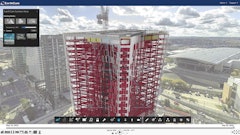
How do you know whether your employees are as productive as you need them to be? The impact associated with not measuring worker performance is probably much bigger than you realize. If you can't tell how productive each of your workers is you can't possibly know which ones to pay higher wages to, which ones to give more responsibility to and which ones to jettison. Although measuring employee performance is very, very hard you had better figure out a way to do it that works.
You will never build a high performance business if you can't distinguish between good workers and average workers. Great workers stand out. They are easy to see. Good workers are much more difficult to identify. Their work results are much more susceptible to inadequate resources, unclear priorities and unforeseen problems.
Good workers are going to do their best, but their best may not produce the results you expect to see. How do you know whether the poor results were caused by lack of effort or whether they were due to being put in a position of failure?
The challenge of measuring employee performance is finding a system that minimizes the influence of emotion and personality. Employee reviews often devolve into a situation where the boss scores performance lower for employees he doesn't like than for employees he does.
The boss letting personal feelings affect performance review is the single biggest complain workers have about reviews. In order to avoid that pitfall you need to devise objective metrics for measuring performance.
Several items I suggest herein may not appear to lend themselves to easy measurement. Here's the trick: use a five-point scale. One means frequent failure. Five means near perfect performance. Three corresponds to average and acceptable performance.
Measuring field worker performance is fairly straight forward. Field workers have three performance requirements: work safe, work fast and produce good quality. So that's what you should be tracking: safety, productivity and quality. For your foremen you will need to add metrics to cover paperwork (quality and timeliness), planning and organization, and decision making.
Measuring front office performance is much more challenging. White collar productivity is virtually impossible to measure unless you have several people doing the exact same job (like payables). In a construction office that is very unlikely to occur. Performance measurement of your office workers is going to be more subjective than it will be for your field workers. Let's look at the different positions one at a time.
Estimator's have just a handful of tasks they need to perform well. First and foremost, they need to be able to predict man-hours accurately. Second, they need to be able to crank through several bid sets in a short period of time. While cranking through those bids they need to avoid take-off errors. They need to analyze job costing data to identify underlying production rates. And finally, they need to track pricing mark-ups so they know which prices to submit to maintain their backlog at the most profitable margins possible. Track how well they do on each one of these tasks.
Sales staff performance is the easiest to measure and judge. Track the amount of gross profit they sold. Track the amount of revenue they sold. Track the amount of new customers they generate.
Now we are getting to the more difficult office positions to measure. Project Managers have a lot on their plates. You could track the volume of projects they oversee. Track their success at bringing their projects in on time and on budget. Track the timeliness and completeness of their billings. Track the effectiveness of their resource management.
Clerical, bookkeeping and accounting staff should be measured on three factors: error rate, timeliness and quantity. If you have ever worked with a really skilled bookkeeper it may shock you how much processing he can do fast and error free. At my old management consulting firm we had a bookkeeper who ran the books flawlessly for seven different entities. Our bosses loved to set up a new company every time they made some type of investment.
Here's a tough one. How to you judge the performance of your safety man? I would offer that your insurance modifier may be a good measure. No injuries and no OSHA violations indicates he is doing his job.
This should be enough examples for you to work from and adapt for positions I didn't address. But do address them. Do deploy an employee performance measurement system. You need that in order to provide employee feedback that has some teeth.
Most contractors turn a blind eye to the problem of employee feedback. That is a serious mistake. That approach lets slackers off the hook which in turn hacks off your good employees. Furthermore, good employees want feedback. They want to know how to do better. They want to know what they need to do to get a raise or a bonus. They want to know what they need to do to move into greater positions of responsibility. If you can't identify your good employees you are apt to lose them.
Measuring employee performance is hard. Giving legitimate and profession feedback is hard. Let's face it, almost everything you do in your construction business is hard. No experienced sane person ever said running a business is easy. Measuring employee performance is just one of many annoying and bothersome tasks you're going to need to do well if you want to build a high-performance, high-profit business.



























